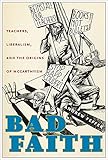Bad Faith : Teachers, Liberalism, and the Origins of McCarthyism / Andrew Feffer.
Material type: TextPublisher: New York, NY : Fordham University Press, [2022]Copyright date: ©2019Description: 1 online resource (320 p.) : 8Content type:
TextPublisher: New York, NY : Fordham University Press, [2022]Copyright date: ©2019Description: 1 online resource (320 p.) : 8Content type: - 9780823281183
- Anti-communist movements -- New York (State) -- New York -- History -- 20th century
- Communism and education -- New York (State) -- New York -- History -- 20th century
- Community colleges -- New York (State) -- New York -- History -- 20th century
- Public schools -- New York (State) -- New York -- History -- 20th century
- American Studies
- Education
- Political Science
- EDUCATION / History
- 1940s
- McCarthyism
- New York City school system
- Rapp-Coudert investigation
- Red Scare
- anti-communist liberalism
- anticommunism
- political ideology
- teachers unions
- the union movement
- 371.0109747 23
- online - DeGruyter
| Item type | Current library | Call number | URL | Status | Notes | Barcode | |
|---|---|---|---|---|---|---|---|
 eBook
eBook
|
Biblioteca "Angelicum" Pont. Univ. S.Tommaso d'Aquino Nuvola online | online - DeGruyter (Browse shelf(Opens below)) | Online access | Not for loan (Accesso limitato) | Accesso per gli utenti autorizzati / Access for authorized users | (dgr)9780823281183 |
restricted access online access with authorization star
http://purl.org/coar/access_right/c_16ec
In late summer 1940, as war spread across Europe and as the nation pulled itself out of the Great Depression, an anticommunist hysteria convulsed New York City. Targeting the city's municipal colleges and public schools, the New York state legislature's Rapp-Coudert investigation dragged hundreds of suspects before public and private tribunals to root out a perceived communist conspiracy to hijack the city's teachers unions, subvert public education, and indoctrinate the nation's youth. Drawing on the vast archive of Rapp-Coudert records, Bad Faith provides the first full history of this witch-hunt, which lasted from August 1940 to March 1942. Anticipating McCarthyism and making it possible, the episode would have repercussions for decades to come. In recapturing this moment in the history of prewar anticommunism, Bad Faith challenges assumptions about the origins of McCarthyism, the liberal political tradition, and the role of anticommunism in modern American life. With roots in the city's political culture, Rapp-Coudert enjoyed the support of not only conservatives but also key liberal reformers and intellectuals who, well before the Cold War raised threats to national security, joined in accusing communists of "bad faith" and branded them enemies of American democracy. Exploring fundamental schisms between liberals and communists, Bad Faith uncovers a dark, "countersubversive" side of liberalism, which involved charges of misrepresentation, lying, and deception, and led many liberals to argue that the communist left should be excluded from American educational institutions and political life. This study of the Rapp-Coudert inquisition raises difficult questions about the good faith of the many liberals willing to aid and endorse the emerging Red scare, as they sacrificed principles of open debate and academic freedom in the interest of achieving what they believed would be effective modern government based on bipartisanship and a new and seemingly permanent economic prosperity.
Mode of access: Internet via World Wide Web.
In English.
Description based on online resource; title from PDF title page (publisher's Web site, viewed 24. Mai 2022)


